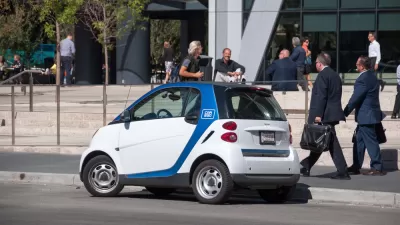Arriving just in time in the District of Columbia, as Safe Track disrupts Metro service, General Motors launched 'Maven' to compete with ZipCar, Car2Go, and Enterprise car sharing services.
"Maven, a car-sharing service launched by General Motors, open[ed] for business Monday [July 18] in the District offering 40 vehicles in 10 lots scattered throughout the city," reports Lori Aratani in the Dr. Gridlock column for The Washington Post.
The company hopes to distinguish itself from other players in the market by offering “new vehicles with high trim levels.” The OnStar suite of services, which includes keyless entry, also will be available for users free of charge.
"To be honest, though, it sounds a whole lot like the other roundtrip car-sharing services available locally—except with fewer cars and parking spots," writes Rachel Sadon for DCist.
Zipcar, for example, has a fleet of more than 1,000 cars, and just added one-way trips around the region to boot. So is there any reason to give Maven a go?
With no membership fee, is there any reason not to? And rates are competitive, adds Sadon.
Prices for Maven start at $8 an hour for compact cars, like the Spark [and VOLT], to $14 for premium cars like the Cadillac ATS and standard SUVs like the GMC Yukon, up to $24 for the Escalade. Zipcar's rates start at $8 an hour, while Enterprise's start at $5.
More importantly, all car-sharing services may be in demand to fill the gaps left by SafeTrack reductions in service as D.C. Metro tries to "accelerate three years' worth of work into approximately one year," according to Metro.
Platform for self-driving cars?
Wired has speculated that the roll-out of Maven—which started in Ann Arbor and has since also expanded to Boston and Chicago—is actually just the foundation for the driverless future that GM plans to build.
As one entrant into the industry emerges, one departs
Bay Area-based FlightCar will be shutting down, reports Austin Walsh for the Daily Journal on July 19. FlightCar appeared to offer a unique service, more part of the sharing economy than their competitors.
The FlightCar business model was built around facilitating travelers renting their cars to others while they were out of town. Those who used the site’s services would receive a share of the rental proceeds, a free lift to the airport and a car wash.
However, all is not lost.
The essence of the FlightCar will live on though, as the technology platform has been sold to Mercedes-Benz Research & Development North America [see October post], and will be used to beef up the luxury car brand’s innovation lab for new services, according to [their] announcement.
Mercedes-Benz already owns car-sharing company Car2Go. In April, BMW launched ReachNow in Seattle, modeled on Car2Go.
Hat tip to POLITICO Morning Transportation.
FULL STORY: GM launches new car-sharing service in D.C.

Alabama: Trump Terminates Settlements for Black Communities Harmed By Raw Sewage
Trump deemed the landmark civil rights agreement “illegal DEI and environmental justice policy.”

Study: Maui’s Plan to Convert Vacation Rentals to Long-Term Housing Could Cause Nearly $1 Billion Economic Loss
The plan would reduce visitor accommodation by 25% resulting in 1,900 jobs lost.

Why Should We Subsidize Public Transportation?
Many public transit agencies face financial stress due to rising costs, declining fare revenue, and declining subsidies. Transit advocates must provide a strong business case for increasing public transit funding.

Paris Bike Boom Leads to Steep Drop in Air Pollution
The French city’s air quality has improved dramatically in the past 20 years, coinciding with a growth in cycling.

Why Housing Costs More to Build in California Than in Texas
Hard costs like labor and materials combined with ‘soft’ costs such as permitting make building in the San Francisco Bay Area almost three times as costly as in Texas cities.

San Diego County Sees a Rise in Urban Coyotes
San Diego County experiences a rise in urban coyotes, as sightings become prevalent throughout its urban neighbourhoods and surrounding areas.
Urban Design for Planners 1: Software Tools
This six-course series explores essential urban design concepts using open source software and equips planners with the tools they need to participate fully in the urban design process.
Planning for Universal Design
Learn the tools for implementing Universal Design in planning regulations.
Smith Gee Studio
Alamo Area Metropolitan Planning Organization
City of Santa Clarita
Institute for Housing and Urban Development Studies (IHS)
City of Grandview
Harvard GSD Executive Education
Toledo-Lucas County Plan Commissions
Salt Lake City
NYU Wagner Graduate School of Public Service




























